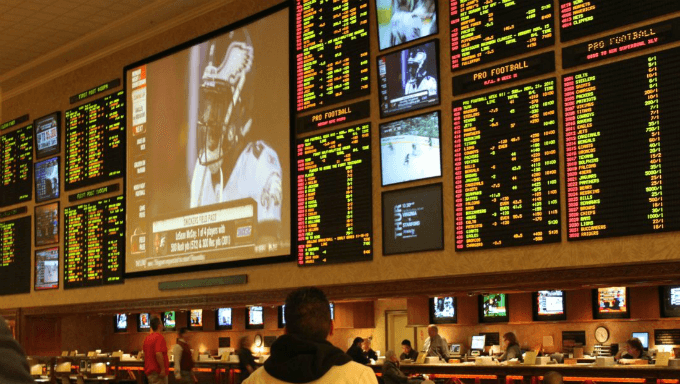On Tuesday 14 May, the one-year anniversary of the repeal of the Professional and Amateur Sports Protection Act (PASPA), the American Gaming Association (AGA) revealed the Responsible Marketing Code for Sports Wagering.
Since the repeal of PASPA, the count of states offering legal and regulated sports betting has risen to eight, while a handful of other states are poised to launch legal sports betting in the coming months.
As more states continue to legalize sports betting, it is essential that the activity is promoted in a safe and responsible way that does not harm vulnerable individuals.
With that being said, let’s take a closer look at the AGA’s Responsible Marketing Code for Sports Wagering and find out what industry professionals have to say about the new marketing guidelines.
Creating the responsible marketing code
According to the AGA’s initial press statement, the code was developed in collaboration with its member organizations which include gambling giants such as Caesars, MGM Resorts, FanDuel and The Stars Group.
Casey Clark, the AGA’s Vice President of Strategic Communications told BettingUS that it took between six and eight months to finalize the responsible marketing code.
Clark said: “This has been an iterative process with our members for six to eight months. As we’ve said about sports betting legalization in general, we only get one chance to get it right, so we undertook a very deliberate process, and allowed for significant feedback and contribution from our membership.”
While creating the new marketing code, the AGA drew inspiration from different sports betting markets across the world.
Clark went on to say: “How other, more mature sports betting markets around the world and, closer to home, in Nevada, operate has been incredibly insightful as we approached legalized sports betting in general, and certainly the development of this Code.
“Advertising bans in Europe, and even the backlash against over-saturation of advertising that we saw with Daily Fantasy Sports several years ago in the US are cautionary tales. Through adherence to the Code, AGA members are proactively committing to taking a thoughtful approach to sports betting marketing.”
What is covered in the AGA’s code?
The code includes several measures that are intended to help restrict underage gambling, promote safe and responsible gambling and ensure that traditional and digital marketing methods are appropriate for US audiences.
James Johnston, a partner at law firm Davis & Gilbert LLP, who has been following the spread of sports betting in the US told BettingUS that the “AGA’s Responsible Marketing Code for Sports Wagering will smooth the transition to a regulated US sports betting market and provide some breathing room for the industry to establish the norms and infrastructure necessary for growth.”
Johnston went on to say that the AGA’s Responsible Marketing Code for Sports Wagering is similar to the marketing codes introduced by the Distilled Spirits Council and the Beer Institute for promoting alcoholic beverages.
“Those marketing codes, along with lobbying activities by the trade groups, have been successful in largely maintaining an industry-driven self-regulatory framework for the marketing of beer and liquor and the AGA no doubt hopes to replicate their success,” said Johnston.
Looking closer at the marketing code
The AGA’s marketing code states that operators using websites and digital media to advertise sports betting products must have geolocation technology in place, to ensure that bets can’t be placed in states that have yet to legalize sports betting.
Clark said: “The Code is a first step towards extending the gaming industry’s commitment to responsible gaming, and every stakeholder involved in this new sector shares this responsibility. That includes media organizations, sports franchises, leagues and others the AGA has spent years educating them on this and other aspects of legal sports betting.”
It is also worth mentioning that the marketing guidelines apply to companies “operating in partnership with or as agents of AGA members,” which suggests this code also applies to affiliate marketing companies that work alongside members of the AGA.
Under the new marketing standards, sports betting advertising should only take place on media channels where at least 71.6% of the audience is expected to be of legal gambling age. The code also states that sports betting should not be promoted in colleges or universities.
Johnston added: “From a demographic perspective, most of the programming where sports betting content and advertising will run likely already meets the 71.6% minimum legal gambling age threshold. This threshold mirrors the threshold used by the Distilled Spirits Council in its code of responsible advertising and marketing practices. It has not inhibited robust marketing for beer and liquor advertising on television and online.”
“More interestingly, the rise of native advertising and branded content provides the most interesting opportunities and challenges for the marketing of sports betting. Media organizations are increasingly offering advertisers deeper integration and input into content development and distribution. Sports programming suits this trend perfectly, with opportunities to embed sports betting into games and matches. Yet, this immediacy also poses higher risks for problem gamblers.”
It will be interesting to see how the industry copes with marketing sports betting via different channels, as several partnerships have already been formed between broadcasters and gambling companies. Earlier this month, ESPN and Caesars partnered for sports betting content, which will see Caesars data and branding being displayed across ESPN’s programming and content.
This month also saw The Stars Group partner with Fox Sports to launch Fox Bet, a real-money sports betting app. It remains to be seen just how the sports betting platform will be promoted to US audiences.
How will the AGA enforce responsible marketing?
The AGA’s marketing guidelines did not discuss how it would enforce its new rules or how it would deal with member organizations that fail to abide by the standards. However, the code acts as a pledge which requires AGA members to abide by certain marketing practices.
According to Johnston, “the most likely use of the Code in enforcement will be in class action lawsuits and regulatory actions that cite to noncompliance with the Code as evidence of unfair and deceptive marketing practices.”
Reception
So far, the AGA’s marketing guidelines have been very well received by operators and stakeholders in the industry.
A spokesperson for The Stars Group told BettingUS “our goal is to reach and welcome players into a safe and well-regulated betting environment where they can be certain of the integrity of our games and the security of their funds.
“Advertising is, of course, an important part of this. It helps us to keep our audience well-informed, helps them to differentiate between regulated and black market operators, and promotes healthy competition within the marketplace.
“It is essential, however, that the proper checks and balances are in place to ensure that advertising is undertaken responsibly and sustainably. We consider these guidelines an important step in the right direction as the regulated industry sets the standards for its future in the United States.”
Despite its positive reception, it has been less than a month since the guidelines were introduced, meaning it is too early to make any judgements or long-term predictions as to how successful these guidelines will be.
Johnston echoed this sentiment saying, “it is being viewed as a good first step, particularly in light of headwinds faced in other countries. But many are taking a wait-and-see attitude on whether it will be sufficient to head off government regulation.”
Is this enough to combat the spread of problem gambling in the US
Gambling companies have a responsibility to ensure that sports betting is promoted safely and responsibly in a way that does not harm vulnerable individuals.
Johnston believes that the marketing code on its own will not have a significant impact on reducing problem gambling in the US.
He said: “The Code is designed to promote gambling as a form of entertainment rather than a means to financial success. Yet, even a cursory look at state lottery and daily fantasy sports advertising shows that this is a blurry line and it will be difficult for AGA members not to promote the financial allure of gambling.
“Even if you assume that marketing messages will not target consumers at-risk to become problem gamblers and the rate of problem gamblers remains constant, simply the increase in ease and availability of sports betting and the increase in the volume of sports betting marketing messages will pose challenges for problem gamblers.”
“The Code does not regulate the volume of marketing messages that AGA members can or should send out and the rise of the daily fantasy sports industry shows how quickly the media can become saturated with sports betting advertising,” added Johnston.
“This can contribute to a perception that problem gambling is spreading, even if it is only becoming more visible due to a higher volume of sports betting generally.”
With that being said, only time will tell how effective the AGA’s Responsible Marketing Code for Sports Wagering will be.
Clark added: “There’s still work to do, but this Code sets the bar and our hope is that our partners in these adjacent industries adhere to the same high standard that AGA members do.”
The AGA’s Responsible Marketing Code for Sports Wagering can be read in its entirety, here.






